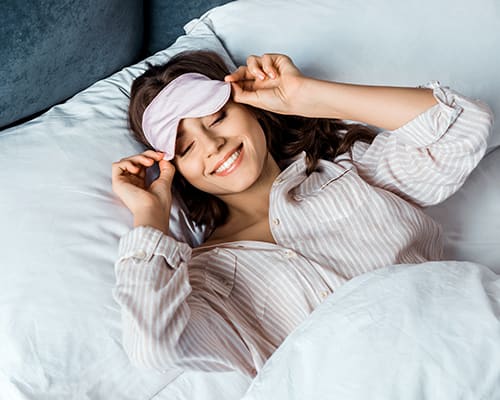Cognitive Behavioral Therapy for Insomnia (CBT-I) - Proven Methods
Cognitive Behavioral Therapy for Insomnia (CBT-I) - Proven Methods
Blog Article
Efficient Treatment Solutions for Managing Sleep Disorders and Enhancing Relaxed Rest
In the realm of healthcare, the management of rest conditions and the quest for restful rest are critical parts of overall well-being. Reliable therapy remedies supply a diverse approach to deal with these obstacles, varying from cognitive behavior treatments to all natural techniques that promote leisure and mindfulness. The exploration of various approaches, including the assimilation of drug and light therapy, opens a realm of opportunities in the quest of far better sleep top quality. As we navigate the detailed landscape of sleep disorders and look for to enhance our sleep experience, a much deeper understanding of these therapy solutions may hold the trick to opening a much more relaxing and satisfying restorative trip.
Cognitive Behavioral Therapy for Sleep Problems (CBT-I)
Cognitive Behavioral Therapy for Insomnia (CBT-I) is an organized, evidence-based therapy approach that concentrates on dealing with the underlying factors adding to sleep disturbances. This kind of treatment aims to change actions and thoughts that exacerbate insomnia, eventually advertising healthy and balanced rest patterns. CBT-I generally includes several crucial parts, consisting of cognitive treatment, sleep constraint, stimulation control, and rest hygiene education and learning.
Cognitive treatment helps individuals determine and change adverse idea patterns and ideas concerning rest that might be impeding their ability to fall or remain asleep. Rest constraint entails restricting the quantity of time invested in bed to match the person's real rest duration, consequently raising rest performance (insomnia counseling). Stimulus control strategies assist establish a strong organization between the bed and rest by urging individuals to go to bed only when sleepy and to avoid participating in promoting activities in bed
Moreover, sleep health education concentrates on creating healthy rest behaviors, such as keeping a consistent rest schedule, producing a relaxing bedtime routine, and enhancing the rest environment. By dealing with these factors thoroughly, CBT-I provides a reliable non-pharmacological intervention for managing sleeping disorders and boosting general rest high quality.
Sleep Hygiene Practices
Having actually developed the foundation of cognitive restructuring and behavior modifications in attending to sleep problems with Cognitive Behavior modification for Sleep Problems (CBT-I), the focus currently moves in the direction of exploring necessary Sleep Health Practices for keeping optimal rest high quality and total health.
Rest hygiene methods include a series of practices and environmental variables that can considerably influence one's capability to sleep and remain asleep throughout the evening. Regular sleep and wake times, creating a relaxing bedtime routine, and enhancing the sleep atmosphere by keeping it dark, quiet, and cool are critical components of good sleep hygiene. Limiting exposure to screens prior to going to bed, avoiding energizers like high levels of caffeine near to going to bed, and involving in normal physical task throughout the day can also advertise far better rest quality.
In addition, exercising leisure methods such as deep breathing workouts or reflection prior to bed can help relax the mind and prepare the body for sleep. By incorporating these rest hygiene practices right into one's daily regimen, individuals can establish a healthy rest pattern that supports relaxed sleep and overall health.
Relaxation Strategies and Mindfulness
Carrying out leisure strategies and mindfulness methods can play a pivotal function in promoting a feeling of calmness and promoting quality rest. In addition, directed images can assist move people to a tranquil area in their minds, aiding in anxiety decrease and improving sleep quality.
By integrating these techniques into a bedtime regimen, people can signify to their bodies that it is time to loosen up and prepare for sleep. Overall, incorporating leisure methods and mindfulness methods can dramatically add to handling rest problems and boosting general rest high quality.

Medication Options for Sleep Disorders
After checking out leisure methods and mindfulness methods as non-pharmacological treatments for improving sleep quality, it is important to consider medication options for people with sleep disorders. In cases where lifestyle modifications and treatment do not provide sufficient relief, medication can be a useful device in managing sleep disruptions.
Typically recommended medications for rest disorders include benzodiazepines, non-benzodiazepine hypnotics, antidepressants, and melatonin receptor agonists. Benzodiazepines, such as diazepam, are sedatives that can help induce rest, yet they are generally recommended for temporary usage because of the threat of reliance. Non-benzodiazepine hypnotics like zolpidem are also used to deal with sleeping disorders and have a lower threat of dependancy compared to benzodiazepines. Antidepressants, such as trazodone, can be useful for people with co-occurring depression and rest disturbances. Melatonin receptor agonists, like ramelteon, target the body's all-natural sleep-wake cycle and can be practical for controling sleep patterns.
It is vital for individuals to speak with a medical care supplier to identify one More Help of the most proper medicine alternative based on their details sleep condition and clinical background.
Light Therapy for Body Clock Law
Light therapy, likewise referred to as photo-therapy, is a non-invasive therapy technique made use of to regulate circadian rhythms and enhance sleep-wake cycles. This treatment involves exposure to intense light that imitates all-natural sunshine, which assists to reset the body's body clock. By subjecting people to specific wavelengths of light, usually in the early morning or night depending upon the preferred result, light therapy can properly adjust the circadian rhythm to advertise wakefulness throughout the day and boost relaxed sleep during the night.
Research has shown that light therapy can be particularly valuable for individuals with circadian rhythm disorders, such as postponed sleep phase syndrome or jet lag. It can also be useful for those experiencing seasonal affective disorder (SAD), a sort of clinical depression that generally takes place during the winter season when all-natural light direct exposure is you could try this out lowered. Light treatment is usually well-tolerated and can be made use of combined with various other treatment methods for sleep disorders to maximize end results and improve total rest top quality.
Verdict
In verdict, effective therapy solutions for managing sleep disorders and enhancing relaxed rest consist of Cognitive Behavior modification for Insomnia (CBT-I), rest health techniques, leisure strategies and mindfulness, medicine options, and light therapy for circadian rhythm policy. These strategies can aid individuals enhance their sleep quality and total health. It is very important to seek advice from with a health care copyright to figure out one of the most appropriate method for dealing with sleep problems.
As we navigate the complex landscape of sleep disorders and seek to enhance our rest experience, a deeper understanding of these treatment go to my site remedies may hold the trick to unlocking an extra relaxing and satisfying restorative journey.
Rest constraint entails limiting the quantity of time invested in bed to match the individual's real sleep period, thus increasing sleep performance. Constant rest and wake times, producing a relaxing going to bed regimen, and maximizing the rest setting by keeping it dark, peaceful, and cool are essential components of excellent sleep health. Light treatment is normally well-tolerated and can be utilized in combination with various other treatment approaches for rest problems to optimize results and improve total sleep high quality.

Report this page